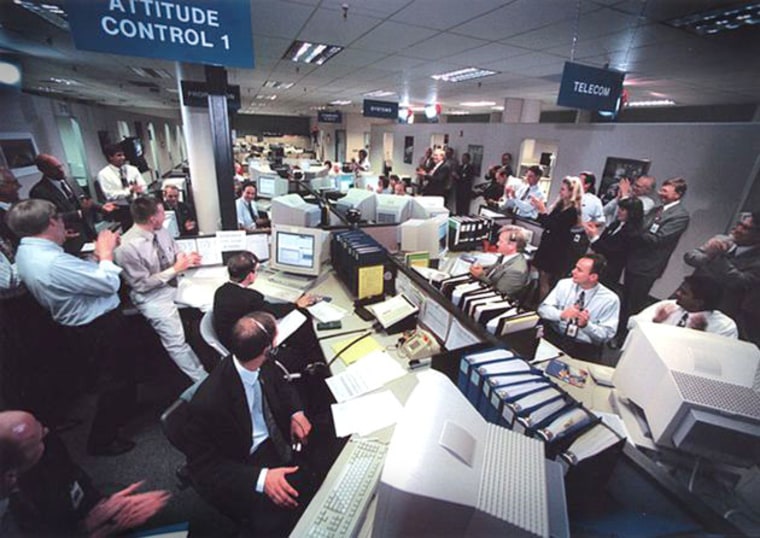Think of it as the Mars equivalent of an emergency 911 call for help.
Operators of NASA's Mars rovers have established a backup remote site in the event of a natural disaster, malfunctioning ground equipment, or even a terrorist attack to maintain critical contact with space vehicles as they near the Red Planet.
The central location for handling the Mars rovers — Spirit and Opportunity — is the Jet Propulsion Laboratory in Pasadena, Calif. The rovers are slated to land on Mars in January. Navigators at NASA's JPL must carefully align each spacecraft to hit a precise atmospheric entry point at Mars in order to reach the desired landing zones — two distinct patches of real estate that the golfcart-sized, wheeled robots will individually inspect.
A unique Emergency Control Center, or ECC, has been set up at Lockheed Martin Space Systems in Denver. If a natural or human-generated event interrupted JPL operations, the ECC would assume control of the vehicles as they streak toward their Mars landings.
Emergency call
"At the ECC, they are the firemen in their firehouse waiting for the alarm bell to ring," said Jim Erickson, a mission manager for the Mars Exploration Rover project. There was a need for "distributed capability," he said, partly due to the prospect that earthquake-prone California might experience a temblor that could impact JPL facilities.
The ECC was put in place in case JPL is unable to do its job for a period of time, such as performing essential trajectory correction maneuvers.
Earthquakes or other events might cause power or communication problems at JPL, experts reasoned. A problem could start as simply as somebody accidentally setting off a smoke detector that triggers a shutdown of computers, Erickson told Space.com.
As Spirit and Opportunity speed toward Mars, the final days prior to each spacecraft entering the Martian atmosphere are critical. "That's a period where we couldn't really afford JPL being down. If we were down, it might be for a couple of days, or maybe just a day. But if it was the wrong day … we'd be in a position that we don't want to be in," Erickson said.
Ready to go
JPL's Erickson said that the ECC is now fully checked out, gear tested, and in standby mode to respond to any problems.
Spirit is to put down on Mars on Jan. 3 at about 11:35 p.m. ET. Opportunity is slated for landing on Jan. 25 at approximately 12:05 a.m. ET.
At Lockheed Martin Space Systems, the aerospace firm is already engaged in mission support operations of several spacecraft, such as the Mars Global Surveyor, Mars Odyssey, Stardust and Genesis. The company is quite familiar with these probes in particular, having designed and built them.
But any emergency handling of the Mars Exploration Rover missions would be a distinctive duty, given that JPL blueprinted the robots, fabricated them and is also managing the project.
Safeguards and satellite phones
A fully trained team of both JPL and Lockheed Martin specialists are staffing the ECC in the Denver-based facility. The company is receiving an unspecified fee for instituting the ECC, with additional fees provided if emergency actions are taken.
Identical sets of Mars Exploration Rover mission software are now loaded into ECC computer control hardware. Each of the twin rover spacecraft has unique command and telemetry settings, Erickson said.
Once the rovers are down on the surface of Mars, the standby role of the ECC would downshift. If a problem cropped up thereafter, the rovers have built-in smarts to wait for the resumption of Earth control telemetry.
And who at JPL would make the hotline call to the ECC if help is urgently needed?
"We have safeguards in that respect. It's not any one person that would be required to make that call. It wouldn't be good to have a person as a single point failure. So we've got about four different people that can do it," Erickson said.
"Just in case the phone lines are down, and the cell phone towers won't work … each of us has a satellite phone in the car trunk."
